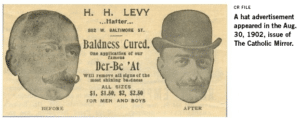For years, a tattered and taped copy of the Aug. 30, 1902, issue of The Catholic Mirror has jockeyed for attention on my sometimes-cluttered desk at the Catholic Review.
>Perched atop Catholic reference books and watched over by a framed photo of a bemused Blessed John Paul II, the crumbling newspaper proclaimed itself the “official organ” of the Archdiocese of Baltimore.
I recently paged through the neglected publication, predecessor to the Catholic Review, and was amazed by the dozens and dozens of advertisements that filled its pages.
“Baldness Cured,” asserted a prominent ad from Baltimore-based H. H. Levy Hatters. The haberdashery promised its hats “will remove all signs of the most shining baldness.” The pitch was accompanied by “before” and “after” images of a grandly mustachioed man with and without a hat.
Suffering from roaches, bed bugs, spiders, centipedes, ants or other insects? The Carrollton Chemical Co. of Baltimore advertised its “Death Dust” twice in the same issue.
“Bugs will not enter a house where Death Dust has been used,” the company promised, one of the “Ds” in the headline encircling a smiling skull.
Drug companies and perhaps a few quacks made numerous medical promises to treat everything from rheumatic problems to stomach ailments.
The Carswell Institute of Baltimore promised its day and night classes could cure stammering “absolutely, infallibly and permanently.” Father Koenig’s Nerve Tonic, prepared in Chicago, could heal nervousness and was sold by local druggists for $1 a bottle. Alcohol and drug users might be interested in “the discovery of a harmless antidote which quickly and permanently removes all desire for liquor and drugs,” according to an ad from a Mr. Dixon in Toronto, Canada.
Dr. Hartley, a nose, throat, lung and ear specialist, made his services available for 50 cents a visit at his office on North Paca Street in Baltimore. The poor, he vowed, would be treated for free from noon to 1 p.m. daily.
Many schools within and outside the archdiocese sought students through the pages of The Catholic Mirror.
An ad for St. Catherine’s Normal Institute on Harlem and Arlington avenues in Baltimore said it offered “particular attention” to the training of organists and Catholic choirs. A selling point for the Mount De Sales Academy of the Visitation in Catonsville was the Edmondson Avenue and Ellicott City trolley car line that passed its main entrance, while Mount St. Joseph College offered five months of boarding school for $115 and classes for day students ranging from $25 to $60 a year.
The Catholic Mirror was chock full of other ads from butchers, piano and organ companies, bell foundries, coffee suppliers, jewelers, clothiers, hardware stores, dentists, curtain suppliers, hotels, insurance companies, pillow makers, a whiskey company and more.
Oh, and if you were interested in a daytrip to Ocean City in 1902, the B., C. and A. Steamer from Pier 4 in Baltimore offered a great deal: a roundtrip excursion for $1.50.
